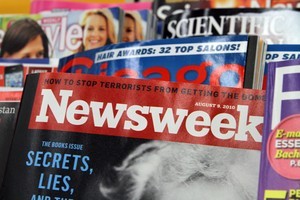Newsweek dừng báo in, chuyển sang điện báo trên mạng — Newsweek’s Move To Digital: The Death Of Print, Or Just The Death Of Newsweek?
Andrew Bender
October 23, 20120 Bình Luận
October 23, 20120 Bình Luận
 Tạp chí Newsweek danh tiếng bậc nhất tại Mỹ sẽ ra ấn bản báo in cuối cùng vào ngày 31/12 tới, sau đó sẽ tập trung toàn lực cho báo mạng từ năm 2013.
Tạp chí Newsweek danh tiếng bậc nhất tại Mỹ sẽ ra ấn bản báo in cuối cùng vào ngày 31/12 tới, sau đó sẽ tập trung toàn lực cho báo mạng từ năm 2013.
Newsweek thông báo hôm 18/10 rằng tờ báo này sẽ chấm dứt 80 năm hoạt động để đương đầu với tình hình kinh doanh báo chí ngày càng khó khăn. Tuần báo này và website thông tin Daily Beast đang thuộc quyền kiểm soát của Tập đoàn IAC/InterActiveCorp.Giám đốc điều hành của Công ty Newsweek Daily BEAST – bà Baba Shetty và Tổng Biên tập Newsweek – bà Tina Brown – cho biết, tờ Newsweek kỹ thuật số sẽ có tên là Newsweek Global và chỉ tồn tại một phiên bản duy nhất trên toàn cầu. Trong thông cáo trên trang web Daily Beast, hai nhà lãnh đạo trên thừa nhận, quyết định ngừng in tờ tạp chí “là do những thách thức kinh tế của ngành xuất bản và phát hành”. Daily Beast là trang thông tin trực tuyến, được bà Brown – vốn là cựu Tổng Biên tập của các tạp chí như The New Yorker, Vanity Fair và Talk – thành lập từ năm 2008. Website của Newsweek vàDaily Beast đã sáp nhập vào năm 2010. Trái với Daily Beast – cho phép truy cập miễn phí và hỗ trợ quảng cáo, Newsweek Global phục vụ bạn đọc trên cơ sở mất phí, mặc dù một số nội dung vẫn phát không trên Daily Beast. Newsweek được kỳ vọng sẽ nhanh chóng phát triển được độc giả online, một phần nhờ sự thịnh hành của các thiết bị công nghệ cao như điện thoại thông minh, máy tính bảng hay các công cụ đọc báo từ Amazon.com và Barnes&Noble. Daily Beast hiện có trên 15 triệu lượt truy cập mỗi tháng, tăng 70% so với một năm trước. Từ nhiều năm nay, ấn bản in của Newsweek đã giảm sút số lượng, từ thời kỳ đỉnh cao trên 3,1 triệu bản/tháng, xuống còn khoảng 1,5 triệu bản vào tháng 6.2012. TờWashington Post đã bán Newsweek cho tỉ phú California Sidney Harman với giá tượng trưng 1USD hồi năm 2010. Sau khi Harman qua đời hồi năm 2011, gia đình ông đã chấm dứt việc đóng góp tài chính cho hoạt động của tạp chí. Giống nhiều tờ báo và tạp chí khác ở Mỹ, Newsweek đã vất vả đương đầu với việc tụt giảm số lượng doanh thu quảng cáo, giảm lượng phát hành và mất độc giả do họ chuộng các dịch vụ tin tức miễn phí trên mạng Internet hơn.
Hiện nay, báo in đang tiếp tục phải hứng chịu sự lấn át mạnh mẽ của kỷ nguyên số hóa và theo một nghiên cứu mới đây của Trung tâm Nghiên cứu Pew (PRC) thì tin tức truyền hình sẽ là “nạn nhân” tiếp theo của xu hướng mới. Tuy nhiên, vấn đề đáng nói ở đây là những người có xu hướng rời xa tin tức truyền hình lại chủ yếu là giới trẻ, những người quyết định loại hình tin tức cho tương lai. PRC chỉ ra rằng, số người trong độ tuổi từ 18-29 xem tin tức qua TV đã giảm từ 42% hồi năm 2006 xuống còn 28% hiện nay. Bên cạnh đó, dịch vụ cáp cũng không khả dĩ hơn là mấy, khi số người có tuổi từ 65 trở lên thường xem các chương trình tin tức qua cáp đang nhiều gấp đôi lượng khán giả có tuổi dưới 30, với tỉ lệ tương quan là 51% với 23%.
Newsweek’s Move To Digital: The Death Of Print, Or Just The Death Of Newsweek?
“We are transitioning Newsweek, not saying goodbye to it.” So read the announcement that the 80-year-old magazine will cease print publication at the end of this year and move to an all-digital format, from Tina Brown and Baba Shetty, respectively founder/editor-in-chief and CEO of the Newsweek Daily Beast Co.
The new publication, to be called Newsweek Global, will operate on a paid subscription basis and be distributed via tablets and the internet. Reactions ran from “it’s about time” to hand-wringing over the death of print as a medium.
Some history first: Newsweek was founded in 1933, and by the 1960s, when it was purchased by the Washington Post Company, it had become what former Newsweek staffer (and current Huffington Post editorial director) Howard Fineman calls “innovative, eminent and influential as any news organization in America or the world.”
Newsweek‘s circulation hovered around 3.1 million between 2001 and 2007, but beginning in 2008, it declined steeply, the magazine’s debt mounted, and complaints rose that the magazine had lost its focus. By 2010, circulation had fallen to below 1.8 million.
Enter Sidney Harman, a nonagenarian, multimillionaire stereo and car navigation equipment mogul described by the New York Times as having “virtually no media experience.” In 2010, Harman purchased the magazine from the Post for $1 plus an assumption of Newsweek‘s $47 million debt. Shortly thereafter, it affiliated with Brown’s Daily Beast, at that time a two-year-old upstart news site. Harman died the following year, and Shetty became CEO just weeks ago. Meanwhile, circulation has continued to slip; as of June 2012, it was around 1.57 million (statistics courtesy of the Audit Bureau of Circulations).
Clearly the status quo was not sustainable, but was the shift to digital-only the right solution? That depends on who you ask. “We have reached a tipping point at which we can most efficiently and effectively reach our readers in all-digital format,” wrote Brown and Shetty in their announcement. “This was not the case just two years ago. It will increasingly be the case in the years ahead.”
Andrew Sullivan, whose influential Dish blog appears on the Daily Beast, wrote that he had advised management to make this change years ago. “Part of me has come to see physical magazines and newspapers as, at this point, absurd,” he wrote, noting that nobody under 30 reads magazines in print anymore. Newspapers and magazines, he wrote, “are like Wile E Coyote suspended three feet over a cliff for a few seconds. They’re still there; but there’s nothing underneath; and the plunge is vast and steep.”
Felix Salmon of Reuters is nowhere near as sanguine about Newsweek Global. “The chances that Newsweek will succeed as a digital-only subscription-based publication are exactly zero,” he wrote. “There’s no demand for a digitalNewsweek, and there’s no reason, either, to carve off some chunk of the NewsBeast newsroom, call it ‘Newsweek’, and put its journalism onto a platform where almost nobody is going to read it.”
Meanwhile, running alongside Brown’s and Shetty’s announcement on the Daily Beast, a “Stories We Like” sidebar touted titles including “What Your Favorite Food Says About Your Sex Life” and “ How to Use the Toilet When Your Girl’s Around.” Although this last one was admittedly enlightening, something tells me these wouldn’t have run in Newsweek.
Andrew Bender, Forbes

Không có nhận xét nào:
Đăng nhận xét